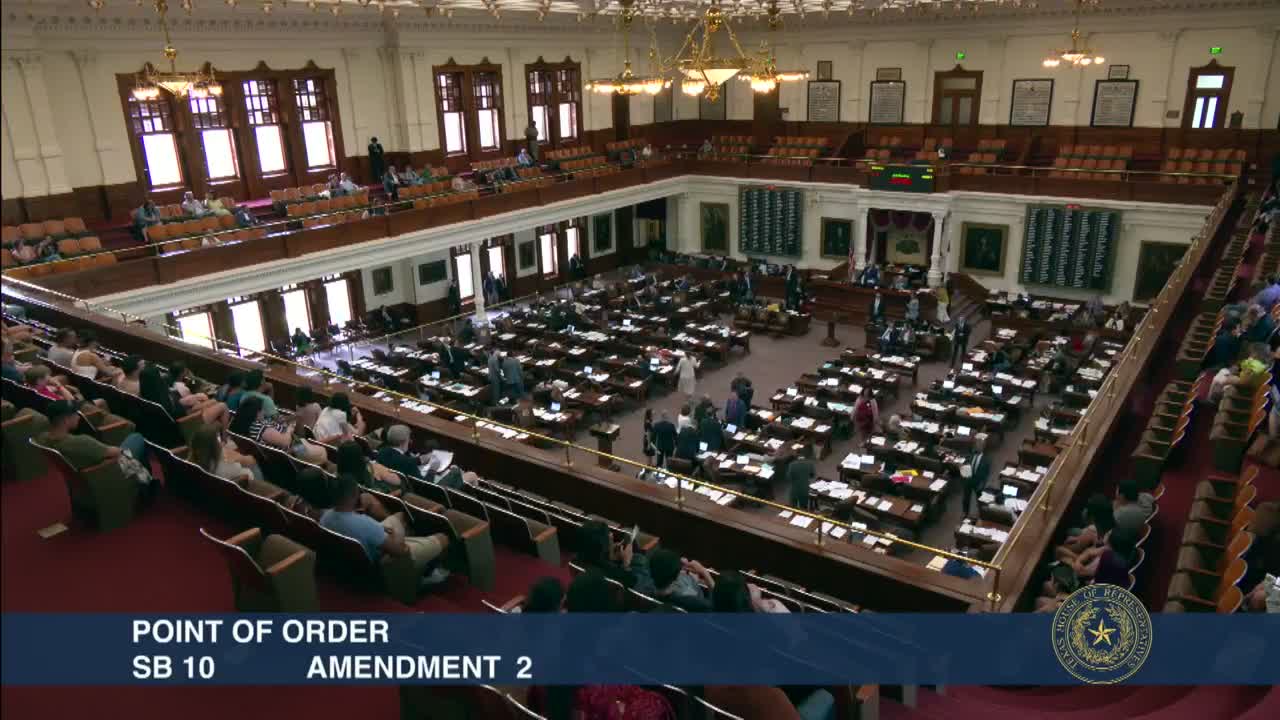Texas Lawmakers Debate Germane Amendments to 10 Commandments Bill
May 25, 2025 | HOUSE OF REPRESENTATIVES, Legislative, Texas
This article was created by AI summarizing key points discussed. AI makes mistakes, so for full details and context, please refer to the video of the full meeting. Please report any errors so we can fix them. Report an error »

In a recent Texas Legislature meeting, significant discussions centered around a controversial bill mandating the display of the Ten Commandments in public school classrooms. The session, held on May 25, 2025, saw multiple amendments proposed to include various religious texts, but each faced challenges regarding their relevance to the original bill.
Mr. Little initiated the debate by raising a point of order against an amendment that sought to include Hindu texts, arguing that it was not germane to the bill focused on the Ten Commandments. This point was upheld, leading to the amendment's dismissal. Similarly, another amendment proposed by Mr. Wu aimed to incorporate Islamic texts but was also deemed non-germane, following a similar objection from Mr. Kane.
Mr. Wu defended his proposal by emphasizing the importance of teaching foundational ideas and principles that shape moral behavior. He highlighted the presence of over 500 million Buddhists worldwide, advocating for the inclusion of Buddhist teachings in the educational framework. However, this amendment too faced a point of order from Ms. Troxclair, who argued it was not relevant to the bill, resulting in its rejection.
The meeting underscored the ongoing debate about religious representation in public education and the complexities of legislative procedures. As the Texas Legislature continues to navigate these discussions, the implications for students and educational environments remain a focal point for community stakeholders. The outcomes of these legislative decisions will likely influence how diverse religious teachings are integrated into Texas schools, reflecting broader societal values and beliefs.
Mr. Little initiated the debate by raising a point of order against an amendment that sought to include Hindu texts, arguing that it was not germane to the bill focused on the Ten Commandments. This point was upheld, leading to the amendment's dismissal. Similarly, another amendment proposed by Mr. Wu aimed to incorporate Islamic texts but was also deemed non-germane, following a similar objection from Mr. Kane.
Mr. Wu defended his proposal by emphasizing the importance of teaching foundational ideas and principles that shape moral behavior. He highlighted the presence of over 500 million Buddhists worldwide, advocating for the inclusion of Buddhist teachings in the educational framework. However, this amendment too faced a point of order from Ms. Troxclair, who argued it was not relevant to the bill, resulting in its rejection.
The meeting underscored the ongoing debate about religious representation in public education and the complexities of legislative procedures. As the Texas Legislature continues to navigate these discussions, the implications for students and educational environments remain a focal point for community stakeholders. The outcomes of these legislative decisions will likely influence how diverse religious teachings are integrated into Texas schools, reflecting broader societal values and beliefs.
View full meeting
This article is based on a recent meeting—watch the full video and explore the complete transcript for deeper insights into the discussion.
View full meeting
